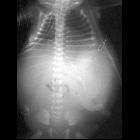limb body wall complex

The limb-body wall complex (LBWC) is a rare variable group of congenital limb and body wall defects (involving mainly the chest and abdomen). They can include:
- abdominoschisis: usually large and left-sided , and almost always present
- thoracic wall defect / thoracoschisis
- anomalies of the lower limbs:
- clubfoot
- brachydactyly
- polydactyly
- syndactyly
- oligodactyly
- absent limbs
- scoliosis (often profound)
- exencephaly
Epidemiology
The estimated incidence is at around 1 in 10-14,000 live births.
Pathology
The etiology is controversial; proposed mechanisms include:
- early amnion rupture
- early vascular disruption
- embryologic malformation with abnormal development of the body folds
Internal organs are frequently affected with a high incidence of cardiac and diaphragmatic defects, bowel atresia, renal agenesis, and hydronephrosis.
Risk factors
- maternal cocaine abuse (probable)
Associations
- neural tube defects
- facial defects - facial clefts
- caudal regression syndrome
- elevated maternal serum AFP levels
- single umbilical artery
Radiographic features
Antenatal ultrasound
May show a large abdominal wall defect with the fetus being adherent to the placenta. The umbilical cord insertion site is challenging to find or is absent, and there is direct apposition of the membranous sac to the amniochorionic membrane. An accompanying kyphoscoliosis/scoliosis may also be detected on ultrasound. Early first-trimester scanning may also show an increased nuchal translucency .
Treatment and prognosis
The condition carries an extremely poor prognosis and is invariably fatal . Management is often supportive. Future pregnancies are however not thought to carry an increased risk of redeveloping the condition.
Differential diagnosis
General imaging considerations include:
- gastroschisis
- omphalocele
- pentalogy of Cantrell
- amniotic band syndrome (some characterize LBWC to fall under the spectrum of the amniotic band syndrome)
- OEIS complex
See also
Siehe auch:
- Skoliose
- Polydaktylie
- Brachydaktylie
- Amniotisches-Band-Syndrom
- Gastroschisis
- caudal regression syndrome
- nuchal translucency
- Klumpfuß
- Syndaktylie
- Myelomeningozele
- Meningoenzephalozele
- Omphalozele
- Akranie
- singuläre Nabelschnurarterie (sNSA)
- OEIS complex
- Neuralrohrdefekt
- Cantrell’sche Pentalogie
- abdominoschisis
- Herzektopie
- orofaziale Spalten
- kongenitale Bauchwanddefekte
- elevated maternal serum AFP levels
und weiter:

 Assoziationen und Differentialdiagnosen zu limb body wall complex:
Assoziationen und Differentialdiagnosen zu limb body wall complex:
















